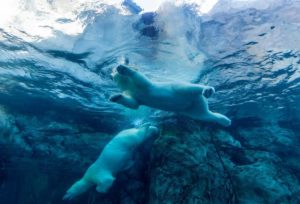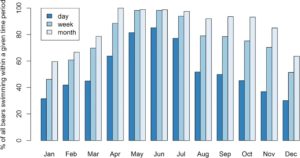Happy World Oceans Day 2019!
Saturday the 8th of June is World Oceans Day. With the health of the world’s oceans in sharper focus than ever this year, WOD2019 looks to be the biggest yet, with hundreds of events happening in every corner of the world. The WOD website lists over 100 events in the UK alone, including beach cleaning, fund-raising events, and in Dundee they created a ‘human wave’ consisting of ‘blue’ people to show support for creating ocean sanctuaries – sections of protected oceans.
The University of St Andrews has long maintained a strong commitment to Marine Science, building the Gatty laboratory in 1896 – you can read more about the history of the lab here – http://synergy.st-andrews.ac.uk/soi/files/2018/04/GattyHistory.pdf. The University has also invested over £16m in a new Scottish Oceans Institute Gatty laboratory, due to be completed this year.
To mark the day we have looked through the extensive St Andrews Research Repository, and have picked out a paper that highlights the affect of polar ice cap melting on polar bears.
Aquatic behaviour of polar bears (Ursus maritimus) in an increasingly ice-free Arctic
 |
The research sought to investigate the aquatic behaviour of polar bears and specifically their ability to swim and dive.
“Reductions in Arctic sea ice are clearly a major threat to this species, but understanding polar bears’ potential behavioural plasticity with respect to the ongoing changes requires knowledge of their swimming and diving skills.” https://doi.org/10.1038/s41598-018-27947-4.
 |
| Copyright the Authors. CC BY. https://doi.org/10.1038/s41598-018-27947-4 |
The study confirmed that individual polar bears spend different amounts of time swimming, from no time at all to as much as 30%. The seasons also affect polar bears’ aquatic behaviour too – with more swimming recorded during the summer months. This suggests that polar bears are capable of adapting to changing levels of ice:
“The considerable swimming and diving capacities of polar bears might provide them with tools to exploit aquatic environments previously not utilized. This is likely to be increasingly important to the species’ survival in an Arctic with little or no persistent sea ice.”
The article goes on to discuss the potential risks this could pose to polar bears, as swimming requires much larger quantities or energy and can be particularly risky for cubs who are prone to hypothermia due to having little insulating fat.
The article was published fully open access in Scientific Reports here – https://doi.org/10.1038/s41598-018-27947-4
And is also available from our repository – http://hdl.handle.net/10023/15306